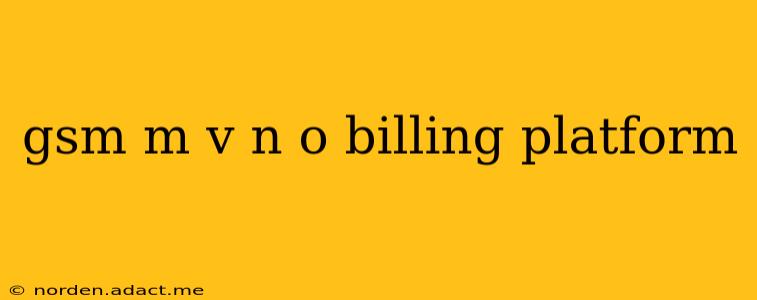The telecommunications industry is constantly evolving, and Mobile Virtual Network Operators (MVNOs) are playing an increasingly crucial role. To succeed, MVNOs require robust and flexible billing platforms capable of handling diverse services and pricing models. This guide delves into the essential features and considerations when selecting a GSM MVNO billing platform.
What is a GSM MVNO Billing Platform?
A GSM MVNO billing platform is a sophisticated software system designed to manage all aspects of billing for a mobile virtual network operator using the GSM (Global System for Mobile Communications) standard. This includes subscriber management, service provisioning, rating, billing, payment processing, and reporting. These platforms must be highly scalable and adaptable to handle varying business models, from prepaid to postpaid, and support a range of value-added services (VAS). Choosing the right platform is critical for operational efficiency, customer satisfaction, and revenue generation.
Key Features of a Robust GSM MVNO Billing Platform
A successful GSM MVNO billing platform needs several key features:
- Real-time rating and charging: Accurate and immediate calculation of charges for voice calls, SMS, data usage, and other services is crucial for efficient billing and revenue management.
- Flexible pricing models: The platform must support various pricing models, including prepaid, postpaid, tiered plans, subscription-based services, and promotional offers.
- Multiple payment gateway integration: Seamless integration with various payment gateways ensures convenient payment options for subscribers, including credit cards, debit cards, mobile money, and other methods.
- Comprehensive reporting and analytics: Detailed reports and analytics provide valuable insights into subscriber behavior, revenue streams, and operational efficiency. This allows for data-driven decision-making and optimization.
- Customer relationship management (CRM) integration: Integration with a CRM system enables personalized customer service and targeted marketing campaigns.
- Scalability and reliability: The platform must be able to handle increasing subscriber bases and transaction volumes without compromising performance. High availability and disaster recovery mechanisms are essential.
- Fraud management: Robust security measures and fraud detection capabilities protect against revenue loss due to fraudulent activities.
- Support for diverse services: The platform should be capable of billing for various services beyond basic voice and data, such as international roaming, VAS, and IoT connectivity.
- Regulatory compliance: The platform must comply with all relevant regulatory requirements in the operator's target market.
What are the Different Types of GSM MVNO Billing Platforms?
Several types of billing platforms cater to the needs of MVNOs, each with its strengths and weaknesses:
- Cloud-based platforms: Offer scalability, flexibility, and cost-effectiveness.
- On-premise platforms: Provide greater control but require significant investment in infrastructure and maintenance.
- Hybrid platforms: Combine the benefits of cloud and on-premise solutions.
The choice of platform depends on factors like budget, technical expertise, and scalability requirements.
How do I choose the right GSM MVNO billing platform for my business?
Selecting the optimal platform involves carefully considering your specific business needs and priorities. Key aspects to evaluate include:
- Functionality: Does the platform offer all the essential features mentioned above?
- Scalability: Can the platform handle your projected growth in subscribers and transaction volume?
- Integration capabilities: Does the platform integrate seamlessly with your existing systems?
- Cost: What are the total costs of ownership, including licensing fees, maintenance, and support?
- Vendor support: Does the vendor provide reliable and responsive support?
What are the benefits of using a GSM MVNO billing platform?
Implementing a robust billing platform offers numerous advantages:
- Improved operational efficiency: Automated billing processes reduce manual effort and improve accuracy.
- Enhanced customer experience: Convenient payment options and personalized services increase customer satisfaction.
- Increased revenue generation: Effective billing and pricing strategies maximize revenue potential.
- Better data-driven decision-making: Comprehensive reports and analytics provide valuable insights for strategic planning.
- Reduced costs: Automated processes and streamlined operations reduce operational expenses.
What are some of the challenges of implementing a GSM MVNO billing platform?
While the benefits are substantial, implementing a GSM MVNO billing platform can present challenges:
- Integration complexity: Integrating the platform with existing systems can be complex and time-consuming.
- Cost of implementation: The initial investment can be significant.
- Security risks: Protecting sensitive subscriber data requires robust security measures.
- Regulatory compliance: Adhering to all relevant regulations can be challenging.
By carefully evaluating the key features, considering various platform types, and understanding the potential challenges, MVNOs can select and implement a GSM MVNO billing platform that empowers them to thrive in the competitive telecommunications market. The right platform forms the backbone of a successful MVNO business.
